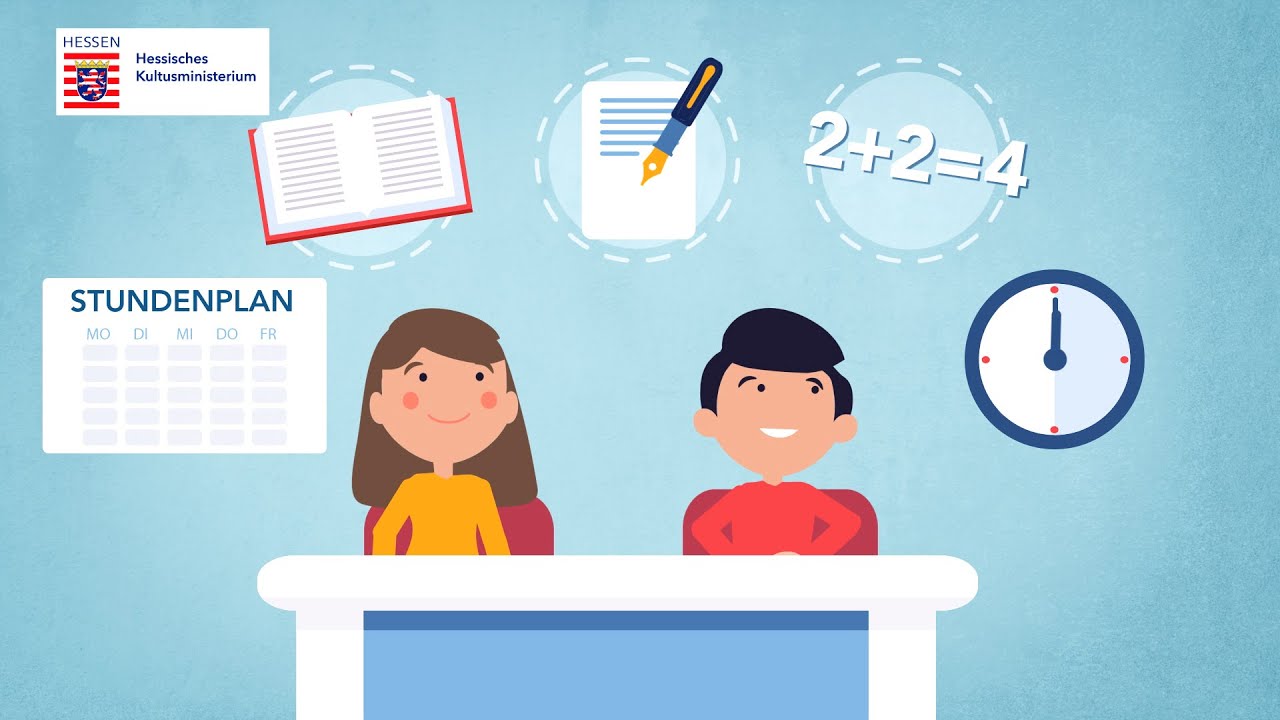Hessen’s school system
In Germany, children aged between 3 and 6 can start to attend nursery (Kindergarten). This is where boys and girls can play together and prepare for school at a young age.
A good education should be made available to everyone in Germany. That’s why people have to attend school up to a certain age in Germany (children aged 6 to 16). School education is free in Germany.
All pupils with impairments and disabilities also attend school in our country. However, they can also be educated at special schools for children with learning difficulties (Förderschule).
Primary school lasts four years
Children usually start to go to primary school (Grundschule) at the age of 6. This is where girls and boys are in one class for 4 years and mainly learn to read, write and do sums.
After primary school, parents decide how their children will continue their education. Primary school teachers offer advice on the possible learning pathways. After all, Hessen has different educational programmes for young people to obtain school leaving certificates.
Once pupils have successfully obtained a school leaving certificate, they also have the chance to advance to the next level of education.
From Hauptschulabschluss to Abitur
The shortest educational programme culminates with the secondary school leaving certificate (Hauptschulabschluss) at the end of 9th grade. Young people can use their Hauptschulabschluss to start vocational training in lots of professions. However, they can also continue attending school to achieve a further leaving certificate.
Pupils who pass the final exam at the end of 10th grade obtain the Realschulabschluss. You can also use this qualification to complete vocational training or obtain more leaving certificates.
The longest educational programme after primary school is taken by pupils who want to obtain the Abitur. This gives pupils the right to study at a university or another higher education institution. However, you can also use this school leaving certificate to start vocational training.
Vocational training combines school with everyday work at a company
If you decide to complete vocational training, you won’t stop learning things at school, because you’ll have two places of learning: Training centres let young people learn about everyday working life, while vocational colleges (Berufsschule) provide them with the necessary theoretical knowledge. Vocational training usually takes three years to complete.
Young people aged 16 and over will also find other academic opportunities at vocational schools to help them on their way to working life. Higher school leaving certificates can also be obtained there. However, pupils also get a concrete insight into various professions.
Language development concept in Hessen
Hessen has a language development concept for young immigrants who don’t have sufficient knowledge of German. There’s everything on offer from pre-school preparatory courses to intensive German development courses and classes for different types of school.
Your child’s teacher will let you know which learning path is the most appropriate for your child. If you’ve moved to Germany and require assistance choosing a school or improving your language skills, the staff at schools and state educational authorities will be happy to help.
Informative film: “Hessen’s school system”

Video abspielen
Bitte beachten Sie hierzu auch unsere Datenschutzhinweise.
The informative film “Hessen’s school system” is also available in German, French and Arabic.
You can find more information on Hessen’s school system on the website of the Hessian Ministry of Education and Religious Affairs



